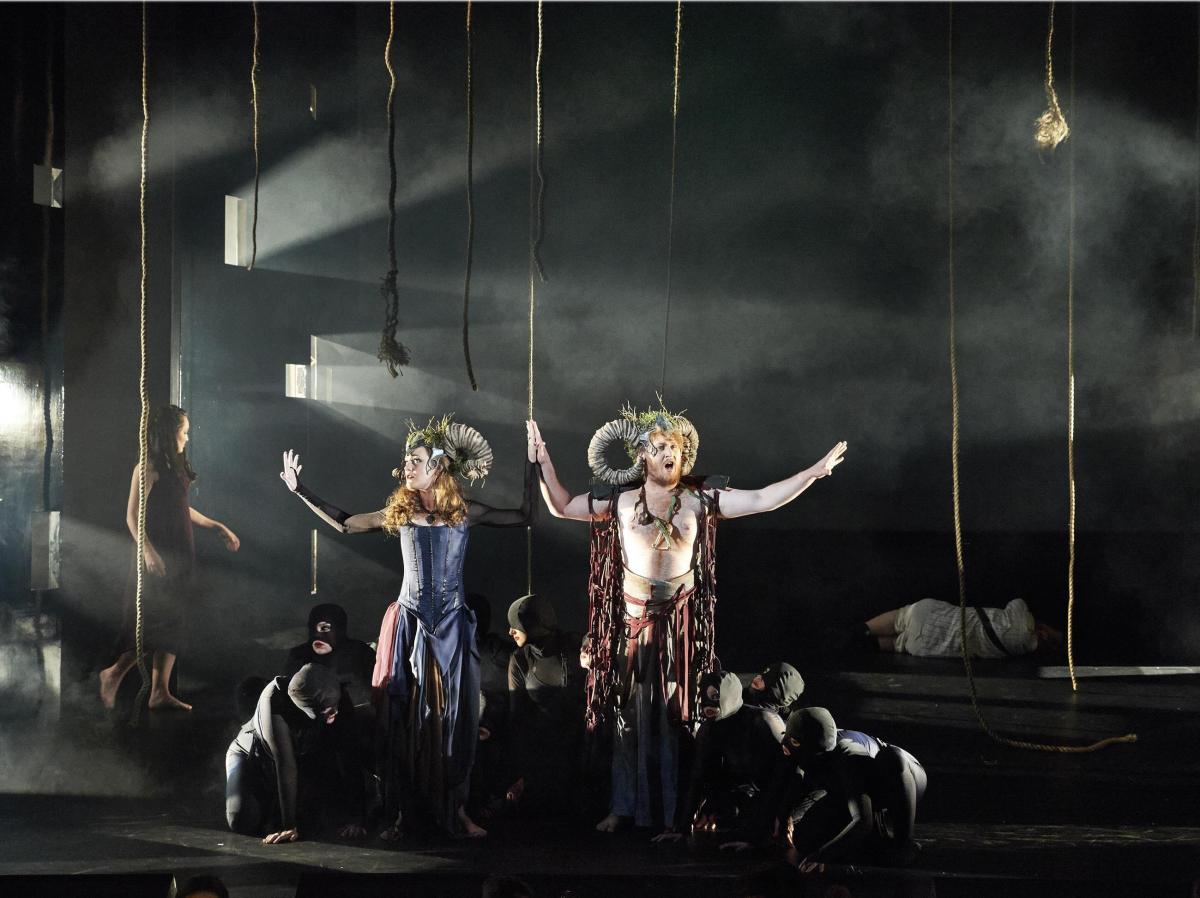Photo: Jon Green
Shakespeare’s popular comedy, crammed full of appealing characters, and Benjamin Britten’s operatic score, overflowing with technical challenges – as a graduation piece, this presents several levels of difficulty. WAAPA’s graduating classical voice students prove their mettle as they not only deliver the complex demands of the notation, but entertain with their choreography and stagecraft.
With alternating casts for the lead roles (nicely named “Pyramus” and “Thisbe” casts, respectively) for each performance, the Thisbe cast is reviewed here. Monica Brierley-Hay plays Titania with vocal confidence, her clear tones emphasised by her magnificent stage presence. Her regal interaction with her fairy retinue and proud stand-off against Oberon are compelling. Ry Charleson’s Oberon is delivered with an eerie, eldritch vocal quality, and his interactions with James Taylor’s scuttling Puck are suitably superior. Eimear Foley as Helena has remarkable vocal pairing with Lachlann Lawton as Demetrius, their tones working together superbly even as their characters fail to get along. Claudia Sosin as Hermia has thrilling vocal quality, and builds a strong stage interaction with Robin Fletcher’s Lysander. As Hippolyta Laura Pitts is wonderfully condescending, and delivers her lines to Jake Bigwood’s Theseus with ease. Bigwood holds his own amongst the other leads to tie up a strong conclusion to the madcap narrative.
All the Mechanicals deliver their roles with lightness, ease and a compelling slapstick. The costuming may help, but it takes plenty of confidence to make the role of a wall your own (Joshua Mitting in hilarious earnestness). Kristin Bowtell as Bottom has the challenges of performing in the different worlds of the humans and of the fairies, and his rich voice and charming stage presence rise to the demands. The fairies sing several sections as a group, and contrive to be perfect with pitch and timing notwithstanding their intricate choreography that adds a dynamic visual dimension to the piece. Kelly Porter, Alysha Massuger, Chloe Manford and Emma Oorschot play against Bowtell to emphasise his dazed existence in the world of the fairies, pitting vocal contrasts as well as choreographed moves to play on the donkey-headed fool’s confusion.
The musical performance, conducted by Richard Gill OAM, is a real treat for those who delight in the complex arrangements of Britten. Far from easy listening, played correctly the lack of traditional harmony becomes compelling, and the talented musicians have rehearsed enough to achieve this quality. While none of the sections could be described as catchy or even conventionally melodic, the precise technical demands enfold the audience and musicians on a mutual adventure of discovery of tones, abrupt changes and a fey disregard for key that reflects the disdain of the denizens of the fairy kingdom for the wills of the human world.
Isabel O’Neill’s sparse set design makes use of large scale projections and effects achieved with smoke and lighting to allow the choreography to reflect the edgy sense created by the score. Creative costuming designed by Frances Danckert allows clear delineation between sets of characters, assisting with the potentially confusing drifts between sets of lovers. Surtitles above the stage make sure that we all follow the lyrical developments, and director Rachel McDonald has centred the whole inchoate set of stories around the silent stillness of the Indian Child at the heart of the feud between Titania and Oberon – Gretel Smith acts as a beacon within a whirlwind set of circumstances throughout.
An exciting experience, both for the high standards demonstrated on the night and the showcasing of future musical excellence for audiences to enjoy in the years ahead.
Rating: 4 stars out of 5
A Midsummer Night’s Dream
A three-act opera by Benjamin Britten and William Shakespeare
Presented by the Western Australian Academy Of Performing Arts
Director: Rachel McDonald
Music Director: Richard Gill OAM
Performed by Classical Voice Students
The Geoff Gibbs Theatre, WAAPA, Mount Lawley
12 – 17 October 2015





